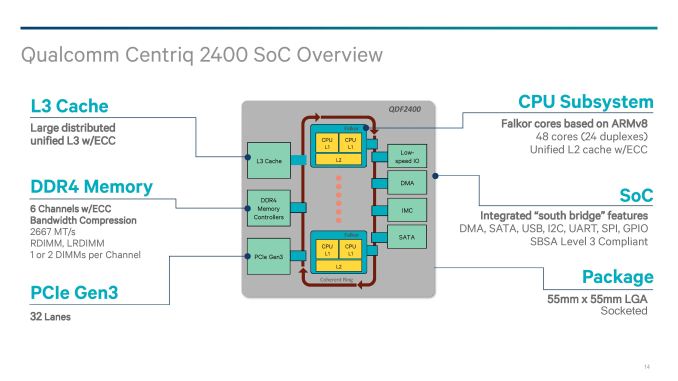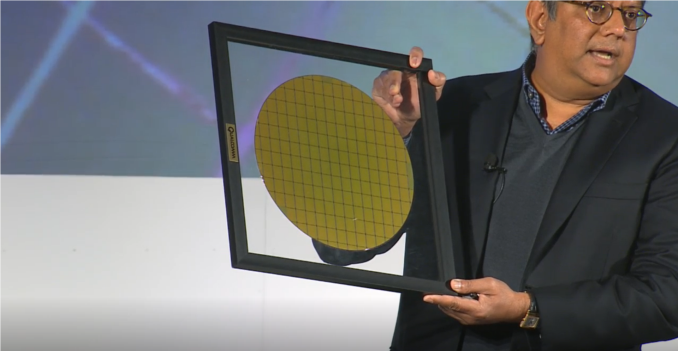Qualcomm’s Server Lead, Anand Chandrasekher, Leaves Company
by Ian Cutress on May 14, 2018 1:50 PM EST- Posted in
- CPUs
- Arm
- Qualcomm
- Enterprise
- Servers
- Centriq
- Centriq 2400

Today Axios is reporting that Anand Chandrasekher, the leading executive in charge of Qualcomm’s server efforts, has left the company. Qualcomm has declined to comment on the departure at this time.
In 2017, Qualcomm announced the Centriq 2400 family of processors, built on Arm architecture cores, for the enterprise and server market. This was meant to be the big break for Arm cores in the server market by a massive player that has the engineering staff and infrastructure to build a sizable customer base. The biggest version of the design implemented 48 of Qualcomm’s Falkor Arm v8 cores, paired with 60 MB of L3 cache, six channels of DDR4, running at a 2.2 GHz base frequency for 120W TDP and a price just shy of $2000: it was set to compete aggressively in the cloud server markets in performance per watt, overall performance, and cost. To date, Cloudflare has made the biggest noise about transitioning its DDoS protection platform from x86 to Centriq.
However, in recent weeks, noise has been made that Qualcomm is attempting to sell its server chip division. Last week Bloomberg reported that Qualcomm was to abandon its push into the datacenter, and that it was looking to either shut or sell the business as it was not making money. This runs in line with a company earnings report last month where CEO Steve Mollenkopf told analysts that ‘Qualcomm is focused on spending reductions in its non-core product areas’. At this time, the server market is not a core area for Qualcomm, even if they have just spent 3-5 years designing Centriq.
Behind the Centriq push was Anand Chandrasekher, who has been leading the unit. He joined Qualcomm from Intel to lead its marketing in mid-2012 , and then switched over to the server role in late 2013 as the President of Qualcomm Datacenter Technologies. However today Axios is reporting that Anand has left the company. News about his destination is unknown, as is the fate of Qualcomm’s server unit and Centriq processors.
Edit: Anand posted this to his Twitter, confirming his departure:
Last day at Qualcomm. In 6 years, we accomplished some great things - proved ARM could deliver better performance/watt than Intel. I leave with some great memories.
— Anand Chandrasekher (@achandrasekher) May 11, 2018












23 Comments
View All Comments
Elstar - Monday, May 14, 2018 - link
ARM servers don't have to be great at everything, they just need to be good enough most of the time to be competitive.jjj - Monday, May 14, 2018 - link
It's not about the CPU anymore anyway. In terms of dollars, Intel already lost a large chunk of the server market to Nvidia, FPAGs, Google's TPU while in terms of compute, they lost absolutely massive share. They are trying to catch up and plug the hole but that's gonna be easy.ARM has said for some years that they are targeting 7nm so you should see sampling next year and deployments in 2020 but what they need to do is to commoditize the CPU and focus on accelerators.
sseemaku - Monday, May 14, 2018 - link
But who will make the actual server cpu product? At this point, seems like everyone has given up!name99 - Tuesday, May 15, 2018 - link
Cavium (perhaps to be rolled into Marvell) is an obvious candidate... As far as I can tell Centriq is a better product than ThunderX 2 (certainly lower power), but ThunderX 2 seems to have a much better PR team. Cavium/Marvell may well pick up what's useful from QC.Next we have Ampere. God knows what their business plan is exactly, but they're supposed to be in this space.
Then we have Fujitsu. They're more targeting HPC, but what they produce may be valuable for some segments of "server".
Then there are various Chinese companies, of which Phytium has the most western visibility. These may be a slow burn, but there are clear political reasons why they would have more or less endless support from the Chinese government, and I think you'd have to be crazy racist or nationalist to believe that China will never be able to create competitive cores.
Beyond these there are a variety of possible dark horses.
What about Oracle buying QC's assets, working with Fujitsu, or otherwise switching to an ARM core? I suspect very little of the delivered value of their HW is the SPARC ISA; it's mostly in the high throughput engine (ie lots of "smallish" cores) and the DB-specific accelerators.
What about Amazon (remember Annapurna...) moving up from their current IoT focus to warehouse specific cores? They're in the same sort of position as Cloudflare, and the same sort of concerns.
What about Apple creating their own data warehouse core and then selling it (or simply selling services that run on it, ala AWS/Azure)?
People have so little imagination, so much certainty that the patterns of today will be the patterns of ten years from now. Ask Blackberry or MS about that. When exactly was it the iPhone came out again --- a thousand years ago, was it? When did AI start becoming a huge thing?
Yojimbo - Thursday, May 17, 2018 - link
Why do you think Centriq is better than Thunder X2? For this sort of thing one needs real world benchmarks. The benchmarks will be different for different real world uses, so to evaluate the size of the market that each processor it competitive with Intel would take a bit of time. Also, Marvell (their buyout of Cavium should close soon) has two different Thunder X2s. The one that has been released is a derivative of Broadcom's Vulcan project. Cavium's internally developed SOC is upcoming and I think will focus on a similar market to Centriq, so you can probably expect it to use less power, as the Centriq does.As far as Ampere, I'd just forget about them until you actually hear some real product being released.
Regarding Cavium's advantage, it's more than just PR. Cavium, and Marvell, have existing data center expertise and channels.
I don't know if Marvell would buy Centriq as they already have two different teams to integrate and two different server SoC lineages. I have no idea who would buy it. Who wants to compete with Intel in server CPUs by trying to break into a market (ARM servers) that doesn't really exist at the moment? The company I can think of that is in the best position to do it, NVIDIA, doesn't seem interested. Certainly someone will buy it, though, even if it's a venture capitalist as with the X-Gene line. I just don't think there's going to be a bidding war for it.
jjj - Monday, May 14, 2018 - link
The rumors about Qualcomm giving up on server ... first you spend money, then you give up before even trying. That's what Intel does with every new market and Qualcomm might want to avoid that disease.At its core, what you need is high perf density and high perf density comes at high efficiency
so find radical solutions for glasses and IoT and apply some of them to server.
Intel can't afford to disrupt a market it owns, outsiders can and should even if the software side is a huge barrier.
Yojimbo - Tuesday, May 15, 2018 - link
It costs a lot less money to do research and development than it does to actually put something into production, especially considering that the results of R&D can probably be sold off to recuperate some of the losses. Production losses are irretrievable. Also, I'm guessing Intel incurred more losses going into marketing and production with their smartphone SoCs than Qualcomm has with their ARM servers.FunBunny2 - Monday, May 14, 2018 - link
proof, once again, that there just aren't all that many embarrassingly parallel user space problems. the ARM approach needs a new OS. who will do that?name99 - Tuesday, May 15, 2018 - link
You're missing the point.This is not a TECHNOLOGY story, about Centriq being a bad or unneeded product.
It is a BUSINESS story about QC, after years of mismanagement, trying desperately to hit certain financial numbers so that the current management team get to stay in place (and continue their reign of destruction...)
The analogy (though with different details) would be to something like Jobs cancelling Newton after he returned as part of the drastic reshaping of the company to keep it alive while he planned its resurrection.
This was not exactly a vote that handheld mobile devices were a bad idea (he then gave us the iPod, followed up of course by iPhone); it was more that at that exact point in Apple history they were a distraction. And, as far as technology goes, rather than Apple's business details, Newton was on the right side of history; Palm Pilot and Treos, various CE devices, Blackberry... It took some floundering, but the prophets of that technology WERE correct in the big picture.
Which of these viewpoints matters to you depends on whether your concern is playing the stock market with a short term horizon, or considering the grand flow of tech.
Yojimbo - Tuesday, May 15, 2018 - link
Seems he reached his limit.